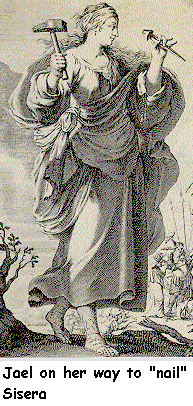The prophetess Deborah went to Barak and told him to march his army up to the River Kishon near the city of Tabor where he would encounter the army of Jabin and where the Lord would grant him a great victory over General Sisera's far superior forces. Sisera had 900 iron chariots at his disposal; Barak had none.
Barak hesitated to believe Deborah's prophecy, and he begged Deborah to accompany the army to make sure the prophecy came true. Deborah agreed to go along on the expedition, but she told Barak plainly that his hesitation meant that he would not get credit for the great victory and that most of the credit would go to a woman named Jael who would personally exterminate General Sisera.
Well, the Lord delivered on Deborah's prophecy; and then Barak's army marched to Jabin's capital at the city of Hazor where his soldiers caught General Sisera's mother trying to escape (they cut her throat) and then they caught King Jabin (they cut off both his big toes and both his thumbs, tormented him for several days, and then killed him with a sword). But as you can see from the picture below, it is the woman Jael whom everyone who reads the Bible remembers.

The Destruction of King Jabin:
A Narrative Poem on Judges 4 and 5
"So let all your enemies perish, Oh Lord!" (Judges 5:31)
King Jabin of Canaan, who reigns in Hazor,
Waits vainly for word of the fight near Tabor.
Jabin's army at noon has clashed with Barak,And King Jabin of Canaan, he waits at Hazor,
But word of this battle will never come back.
For the river of Kishon is reddened with blood
And 900 iron chariots now rust in the mud,
Destroyed by Barak, by his spear, by his sword,
By the sling, by the arrow, by the word of the Lord.
Waits vainly for word of the fight near Tabor.
As the day draws to darkness, he orders a lampKing Jabin of Canaan, awake in Hazor,
While he still hopes for news from Sisera's camp.
An old Hebrew slave who brings him the light
Will be waiting by him through a long eerie night;
And the women are keening and moaning. They know,
Yes, they know from their fears. One will go
To the window and wail through the grate:
"Oh, why is my son still away, so, so late?
Oh, where is the sound of his horses returning?"
Through all of the night the king's lamp is burning.
Waits vainly for word of the fight near Tabor.
For Barak has slain every man, every beast,King Jabin of Canaan, in fear at Hazor,
And now, as the sun starts to climb in the east,
He's searching for Sisera, who fled from the fight,
Who has wandered afoot through a terror-filled night
In search of his ally, Heber the Kenite.
Expecting asylum, protection, and rest,
He trusts the ally and hopes for the best.
Waits vainly for word of the fight near Tabor.
As Deborah the prophetess sang in her song:King Jabin of Canaan, unaware at Hazor,
Blessed be the name of Heber's wife,And just this moment Barak comes along
Blessed be Jael, the Kenite's wife,
Who hides the fleeing Sisera.
In her own tent, she hides him snug
And lulls him with a woolen rug
And fills him with the richest cream
And sends him off to rest and dream
And -- vampire-wise -- in her left hand
She holds a stake against his ear. . .and. . .
And now. . .
And now, without a strain,
She hammers it right through his brain.
And finds King Jabin's general dead
With a foot-long tent stake through his head.
The way to Hazor now stands clear
Where all who are there have much to fear.
Waits vainly for word of the fight near Tabor.
The noonday sun at Hazor's brightKing Jabin of Canaan, destroyed at Hazor,
And in its brightly streaming light
The blood, the gore -- they're plain to see:
A Hebrew slave mistakenly
Run through, Sisera's mother's throat
Sliced through, and please be sure to note
King Jabin lost each great toe and each thumb
Before the final sword thrust made him dumb.
After waiting in vain for the news from Tabor.
-- Warren F. O'Rourke, 2004